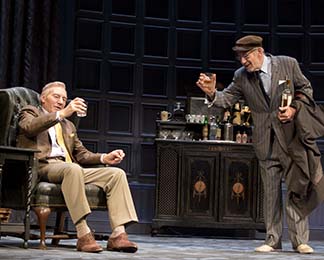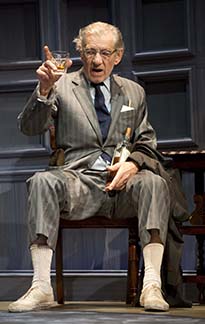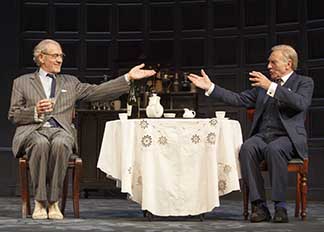
Harold Pinter liked to play games in his plays, teasing the audience, suggesting facts and realities that might or might not be true. He does this in “No Man‘s Land,” written in 1974. It is an acerbic commentary on human nature, with a particular bite of the literary set.
Pinter‘s prickly style is well served by director Sean Mathias and finely acted by Ian McKellen and Patrick Stewart, with strong support from Billy Crudup and Shuler Hensley. If you like intellectual diversions and mysteries, this play is for you.
The setting is a villa, in a strange living room enclosed in round walls of gray squares, almost like a tomb, unusually bare except for a silver bar, a blue/gray rug, a few chairs. Spooner (Ian McKellen) and Hirst (Patrick Stewart), men in their sixties, are getting drunk.
Hirst, well dressed in a sports jacket, is a famous writer an essayist, poet, man of letters. He is pretentious about how he opens his house to poets, but not all poets. Spooner is rather shabby. Hirst apparently picked him up at a local pub, Jack Straw‘s Castle in Hampstead, an area in North London favored by prosperous writers. Spooner introduces himself as a friend of the arts, of poetry, but his ragged persona raises doubts about who he really is and what he does.

McKellen and Stewart are excellent as they embody in voice and body movements the psychology of the over-weaning, successful rich and the desperate, failed poor.
Pinter satirizes the musings of intellectuals. Spooner says that “there are some people who appear to be strong, whose idea of what strength is is persuasive, but who inhabit the idea and not the fact.” Chew on that. He thanks him for asking him in, “kindness itself” in England and in Hampstead. That is a writer‘s joke. And the sarcasm continues, that he won‘t stay, that his security is that he elicits from others constant indifference. You get the feeling that you are inhabiting an intellectual in joke.
Spooner talks about his wife. And Hirst‘s wife. They recall serving tea on the lawn. Spooner asks, “What happened to our cottages? What happened to our lawns?” He says, “We share something. A memory of the bucolic life. We‘re both English.” But the alcohol takes its toll. Hirst collapses and crawls out of the room.
Two employees arrive, both rather threatening, Foster (Billy Crudup) in a leather jacket and cockney accent, who introduces himself as Hirst‘s son, which turns out not to be true; he is the housekeeper. Then Briggs (Shuler Hensley), Hirst‘s secretary, in a brown leather jacket. There‘s the typical Pinter menace in their talk as well as their thuggish clothes.

Hirst comes back still drunk. Soon Foster flips a switch and all goes black. Another threat. In the morning, Spooner, who has been locked in the room, is served breakfast with champagne.
When Hirst returns in pinstripes, there‘s a new mood. He declares that they were friends at Oxford. He says they dined at club there in 1938. Hirst asks, “Did you have a good war?” And then he declares crudely that that he seduced Spooner‘s wife. Pinter likes to write about literary figures‘ betrayals, such as in his play of that name which was inspired by his own wife-betraying affair.
Is any of it true? We don‘t know. But Spooner‘s response to what might be termed psychological abuse is self-humiliation.
The title of the play repeats Hirst‘s comment that “No man‘s land…does not move ….or change…or grow old…remains…forever…icy….silent. Are they living in reality or their imaginations? Pinter doesn‘t want us to know. Intriguing, although sometimes the wordplay around a mysterious void is not altogether satisfying.
No Man’s Land. Written by Harold Pinter; directed by Sean Mathias. Cort Theatre, 138 West 48th St., New York City. 212 239-6200. Opened Nov 24, 2013; closes March 30, 2014. (2/17/2014) New York Theatre Wire review.


Back in the day before Pinter was famous, word was out that he was not above recording phone calls, and transcribing them into a play. This made the rounds, and was treated as not even a rumor. Anyway, audiences have a fascination with obscurity, and it makes for lively discussion. It was Time Magazine that made him famous in the US. They were accepted as reliable arbiters of fashion then. Some of their opinions have stuck. Not so Time’s.